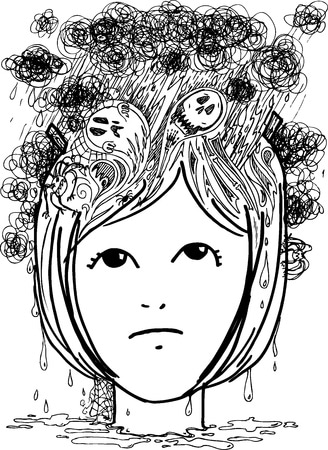
Beliefs form the lens through which we see the world. Since they are “you”, seeing them is very difficult. But our journey to becoming fully conscious human beings is about becoming aware of who we truly are. Knowing our beliefs means knowing who we are.
Most of our beliefs lay below the surface of our conscious minds. We can’t see them yet they still dictate how we think, feel and behave. They are the core and strength of who you are today.
We need to know the foundation upon which our all of our experience is being built. Every moment of every day we are continuously experiencing and behaving and therefore creating a certain way. Our experience and our behaviors and the life we create is a direct reflection of our belief system. This is huge.
It’s not always possible to monitor our specific thoughts, but we can monitor our emotions. Our emotions are the gateway to our belief systems. Belief is the most powerful state of mind because your belief system defines and shapes who you are and determines your every moment of experience. Your belief system doesn’t differentiate or judge, it simply accepts as truth what you feed it.
Underlying Beliefs are the beliefs we commit to so much that they have become automated. These beliefs can be negative or positive. Negative Underlying Beliefs continually sabotage our attempts at creating a meaningful life. They are limiting us in some way. Positive Underlying Beliefs can support our life. They energize us and give us meaning.
Working with Underlying Beliefs
Many clients come to coaching because, whether they see it or not, they have some beliefs that are keeping them from experiencing and living from their inner truth. As coaches, where the belief came from is not very important to us, that is more for therapy.
What we want to do is shine the light on these beliefs and have the client be aware of them. We don’t need to spend a lot of time figuring out where they came from but instead we look deeply into them and use them as starting points for self-realization.
So, what should we be looking and listening for in order to begin uncovering these underlying beliefs?
- Repeated patterns of behavior with repeated outcomes they say they don’t want.
- Contradictions of desired outcomes (i.e. I want more freedom and flexibility but I don’t want to leave my 80 hour a week job).
- Feelings of stuck-ness. When our clients communicate that they are feeling stuck, there are blocks (underlying beliefs) that are keeping them from seeing and taking the actions they want.
- Fears, anxieties, worries and concerns are all big signs that some limiting underlying beliefs are there.
- Listen for generalizations and stereotypes… “I am…” “They are…” “I am not…” “They always…”
- Look for judgment of other people and situations: how people should be, or a situation should be in order for their life or situation to be okay.
Once an underlying belief has been uncovered you can:
- Share what you have heard or feel. Ask for permission to explore it further.
- Reiterate their vision, their reason for being in coaching, and connect the exploration of the belief to their coaching objectives.
- Watch for the fear or anxiety around working with the belief. People will resist going there. Your job is to make it safe.
- Ask: Is this belief really true? What happens when you believe it? Is it serving you where you want to go? Who would you be without this belief?
- Continually affirm and acknowledge them for their willingness to look into these beliefs.
- Help them reframe or formulate the desired belief. What is the new belief that is to take it’s place?
Releasing and then “rewiring” a new belief into our “operating system” takes time and perseverance. It is never an easy thing to outwork a long-held belief, especially one that has been conditioned into you from a young age, and then inwork a new belief.
Transformational coaching’s strength is that it can create the space for our clients to feel at ease in exploring these more difficult aspects of their being and self identity, and find ways to let these beliefs go so that more effective beliefs can take their place.
Most importantly, a transformational coach’s role is to help people find ways to sustain and live through the new belief. It’s one thing to give voice to a desired belief, or know it intellectually, it’s quite another to live it.
The Coach’s Agenda
In order to create this space we need to make sure we are doing the work of overcoming our own limiting underlying beliefs as well. If we aren’t we are at risk of getting in our clients’ way by bringing our own “stuff” into the coaching space without realizing it.
What beliefs or judgments do you hold about your client?
What do you believe “should be” happening or the client “should be” doing to move forward?
What concerns do you have about your own coaching worth and value?
What are your biggest fears when it comes to your work as a coach?
Any underlying beliefs of your own can turn into an agenda. In transformational coaching conversations it’s very important that the coach become aware of his or her own agenda, and doing the work to let it go. In transformational work, we recognize that nothing “needs” to happen. There are no shoulds or musts in transformational work, as transformation is a process with it’s own unique agenda. Our work is to learn to let go of any beliefs whe have in that way, and deeply trust what is happening–because something is always happening.
To give our clients the unconditional space to freely communicate and be heard is the greatest gift we can give them!

